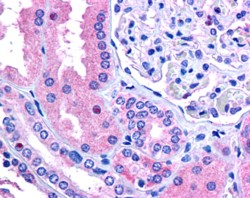Goat Anti-RNF213 / C17orf27 (C Terminus) Antibody
Peptide-affinity purified goat antibody
- SPECIFICATION
- CITATIONS
- PROTOCOLS
- BACKGROUND

Application
| IHC, E |
|---|---|
| Primary Accession | Q63HN8 |
| Other Accession | NP_065965, 57674 |
| Reactivity | Human |
| Host | Goat |
| Clonality | Polyclonal |
| Concentration | 100ug/200ul |
| Isotype | IgG |
| Calculated MW | 591407 Da |
| Gene ID | 57674 |
|---|---|
| Other Names | E3 ubiquitin-protein ligase RNF213, 6.3.2.-, ALK lymphoma oligomerization partner on chromosome 17, Mysterin, RING finger protein 213, RNF213, ALO17, C17orf27, KIAA1554, KIAA1618, MYSTR |
| Format | 0.5 mg IgG/ml in Tris saline (20mM Tris pH7.3, 150mM NaCl), 0.02% sodium azide, with 0.5% bovine serum albumin |
| Storage | Maintain refrigerated at 2-8°C for up to 6 months. For long term storage store at -20°C in small aliquots to prevent freeze-thaw cycles. |
| Precautions | Goat Anti-RNF213 / C17orf27 (C Terminus) Antibody is for research use only and not for use in diagnostic or therapeutic procedures. |
| Name | RNF213 (HGNC:14539) |
|---|---|
| Function | Atypical E3 ubiquitin ligase that can catalyze ubiquitination of both proteins and lipids, and which is involved in various processes, such as lipid metabolism, angiogenesis and cell-autonomous immunity (PubMed:21799892, PubMed:26126547, PubMed:26278786, PubMed:26766444, PubMed:30705059, PubMed:32139119, PubMed:34012115). Acts as a key immune sensor by catalyzing ubiquitination of the lipid A moiety of bacterial lipopolysaccharide (LPS) via its RZ-type zinc- finger: restricts the proliferation of cytosolic bacteria, such as Salmonella, by generating the bacterial ubiquitin coat through the ubiquitination of LPS (PubMed:34012115). Also acts indirectly by mediating the recruitment of the LUBAC complex, which conjugates linear polyubiquitin chains (PubMed:34012115). Ubiquitination of LPS triggers cell-autonomous immunity, such as antibacterial autophagy, leading to degradation of the microbial invader (PubMed:34012115). Involved in lipid metabolism by regulating fat storage and lipid droplet formation; act by inhibiting the lipolytic process (PubMed:30705059). Also regulates lipotoxicity by inhibiting desaturation of fatty acids (PubMed:30846318). Also acts as an E3 ubiquitin-protein ligase via its RING-type zinc finger: mediates 'Lys-63'-linked ubiquitination of target proteins (PubMed:32139119, PubMed:33842849). Involved in the non-canonical Wnt signaling pathway in vascular development: acts by mediating ubiquitination and degradation of FLNA and NFATC2 downstream of RSPO3, leading to inhibit the non-canonical Wnt signaling pathway and promoting vessel regression (PubMed:26766444). Also has ATPase activity; ATPase activity is required for ubiquitination of LPS (PubMed:34012115). |
| Cellular Location | Cytoplasm, cytosol. Lipid droplet |
| Tissue Location | Widely expressed (at protein level). [Isoform 2]: Minor isoform with restricted expression. |

Thousands of laboratories across the world have published research that depended on the performance of antibodies from Abcepta to advance their research. Check out links to articles that cite our products in major peer-reviewed journals, organized by research category.
info@abcepta.com, and receive a free "I Love Antibodies" mug.
Provided below are standard protocols that you may find useful for product applications.
References
Lysine acetylation targets protein complexes and co-regulates major cellular functions. Choudhary C, et al. Science, 2009 Aug 14. PMID 19608861.
A quantitative atlas of mitotic phosphorylation. Dephoure N, et al. Proc Natl Acad Sci U S A, 2008 Aug 5. PMID 18669648.
Large-scale phosphoproteome analysis of human liver tissue by enrichment and fractionation of phosphopeptides with strong anion exchange chromatography. Han G, et al. Proteomics, 2008 Apr. PMID 18318008.
Automated phosphoproteome analysis for cultured cancer cells by two-dimensional nanoLC-MS using a calcined titania/C18 biphasic column. Imami K, et al. Anal Sci, 2008 Jan. PMID 18187866.
The full-ORF clone resource of the German cDNA Consortium. Bechtel S, et al. BMC Genomics, 2007 Oct 31. PMID 17974005.
If you have used an Abcepta product and would like to share how it has performed, please click on the "Submit Review" button and provide the requested information. Our staff will examine and post your review and contact you if needed.
If you have any additional inquiries please email technical services at tech@abcepta.com.













 Foundational characteristics of cancer include proliferation, angiogenesis, migration, evasion of apoptosis, and cellular immortality. Find key markers for these cellular processes and antibodies to detect them.
Foundational characteristics of cancer include proliferation, angiogenesis, migration, evasion of apoptosis, and cellular immortality. Find key markers for these cellular processes and antibodies to detect them. The SUMOplot™ Analysis Program predicts and scores sumoylation sites in your protein. SUMOylation is a post-translational modification involved in various cellular processes, such as nuclear-cytosolic transport, transcriptional regulation, apoptosis, protein stability, response to stress, and progression through the cell cycle.
The SUMOplot™ Analysis Program predicts and scores sumoylation sites in your protein. SUMOylation is a post-translational modification involved in various cellular processes, such as nuclear-cytosolic transport, transcriptional regulation, apoptosis, protein stability, response to stress, and progression through the cell cycle. The Autophagy Receptor Motif Plotter predicts and scores autophagy receptor binding sites in your protein. Identifying proteins connected to this pathway is critical to understanding the role of autophagy in physiological as well as pathological processes such as development, differentiation, neurodegenerative diseases, stress, infection, and cancer.
The Autophagy Receptor Motif Plotter predicts and scores autophagy receptor binding sites in your protein. Identifying proteins connected to this pathway is critical to understanding the role of autophagy in physiological as well as pathological processes such as development, differentiation, neurodegenerative diseases, stress, infection, and cancer.


